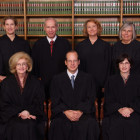
Budget Cuts Could Leave 22 Million Children Without Food Stamps
|
Some 22 million children who depend on the federal nutrition assistance program that replaced food stamps could lose their benefits under a 2013 budget resolution recently approved by the House Agricultural Committee. The budget, approved in April, would cut more than $33 billion over the next 10 years from the Supplemental Nutrition Assistance Program (SNAP). Approximately one third of the proposed cuts are directed at “categorical eligibility” restrictions that could leave as many as two million people per year ineligible for SNAP benefits. The proposed bill would also eliminate more than 250,000 children from automatic enrollment in the Free School Lunch and Breakfast Program. Their benefits could vanish as early as this year if the budget is passed.








